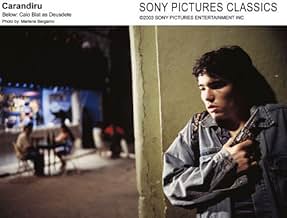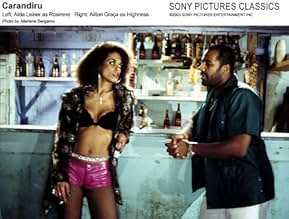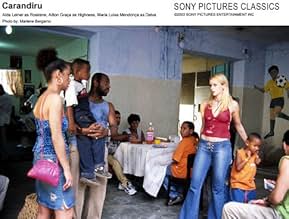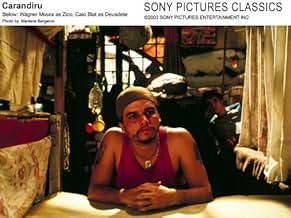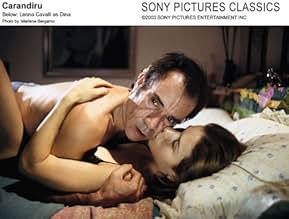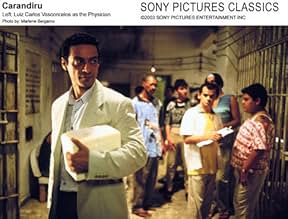Stories of crime, revenge, love, and friendship at the Carandiru Penitentiary, the largest prison in Latin America.Stories of crime, revenge, love, and friendship at the Carandiru Penitentiary, the largest prison in Latin America.Stories of crime, revenge, love, and friendship at the Carandiru Penitentiary, the largest prison in Latin America.
- Awards
- 16 wins & 33 nominations total
Enrique Diaz
- Gilson
- (as Enrique Díaz)
Aida Leiner
- Rosirene
- (as Aída Leiner)
Featured reviews
Carandiru is the true story of the greatest massacre of prisoners in the world. It happened in 1992, in São Paulo, after a rebellion in the greatest Brazilian penitentiary. Doctor Drauzio Varella has written a successful best-seller about this sad event. The great Brazilian naturalized director Hector Babenco (from `Pixote', `Kiss of the Spider Woman', `Lúcio Flávio' etc.), with the support of a fantastic cast, presented a good movie about this wound in our society. The screenplay presents some personal dramas of some prisoners before the invasion of the prison by the Military Police and execution of one hundred and eleven (111) prisoners. The double Brazilian DVD is magnificent:, presenting not only the usual making-of, interviews, deleted scenes and errors, but also the TV News in 1992 after the slaughter. My vote is eight.
As a Brazilian, I saw on TV many of the things that happened inside Carandiru, the biggest jail in Brazil and maybe the biggest in Latin America. I can clearly remember the news where we saw the police invasion and the slaughter they made there instead of stopping the prisoners rebellion
I knew this fact would be shown in Hector Babenco's film, but I could never imagine it would be so strongly illustrated. It's pure violence and the audience gets really astonished. Although it's really sad and we can't avoid being sorry for those deaths and suffering, it's impossible not to like the movie. It's excellent.
It's important to say that the invasion is not the only fact that is shown. Actually the book is based in Drauzio Varela's book. Mr. Varela is a doctor who worked in the jail helping the prisoners. The book, that is called "Estação Carandiru" (Carandiru station - because of the underground station that is nearby) is a success in Brazil.
27-year-old Rodrigo Santoro is one of the best actors we have in Brazil nowadays. His talent on Brazilian TV Series have guaranteed him good roles in films made in the country and recently he has started an international career, once he'll be in "Charlie's Angels 2". Some other good actors like Milton Gonçalves and Caio Blat add more positive points to the production. Some others, unknown up to now, showed they'll probably have much success in the future due to their talent, like Lázaro Ramos.
Argentinean Hector Babenco directed 'Carandiru' with a great sense of art, talent and made his film probably the best one of Brazilian cinema this year.
My rate 10/10
I knew this fact would be shown in Hector Babenco's film, but I could never imagine it would be so strongly illustrated. It's pure violence and the audience gets really astonished. Although it's really sad and we can't avoid being sorry for those deaths and suffering, it's impossible not to like the movie. It's excellent.
It's important to say that the invasion is not the only fact that is shown. Actually the book is based in Drauzio Varela's book. Mr. Varela is a doctor who worked in the jail helping the prisoners. The book, that is called "Estação Carandiru" (Carandiru station - because of the underground station that is nearby) is a success in Brazil.
27-year-old Rodrigo Santoro is one of the best actors we have in Brazil nowadays. His talent on Brazilian TV Series have guaranteed him good roles in films made in the country and recently he has started an international career, once he'll be in "Charlie's Angels 2". Some other good actors like Milton Gonçalves and Caio Blat add more positive points to the production. Some others, unknown up to now, showed they'll probably have much success in the future due to their talent, like Lázaro Ramos.
Argentinean Hector Babenco directed 'Carandiru' with a great sense of art, talent and made his film probably the best one of Brazilian cinema this year.
My rate 10/10
Carandiru is a true hymn of humanity in all of us. What let the Brazilian riot squad shoot down over a hundred inmates was that following both prejudice and the professional drilling they had been subjected to, they regarded the rioters of 1992 as nothing but worthless scum. Bebenco does not defend his characters. Based on the eyewitness account of the prison physician, he presents us with assassins, murderers, robbers and drug-dealers who do not even claim they do not deserve their sentences (although many were kept in prison without convictions). What made them human was their continuous contact with the world outside. The visitation day scene is a memorable tribute to life in a truly Christian sense - everyone deserves to live and to hope not because of his own qualities or deeds, but because of the love others share for him. The character of the serial killer Dagger was essential to this purpose. His solitude in the midst of the modest pleasures of everybody else visited by his close ones was the first sign of the overcoming guilt which eventually took him to the preacher. Let this review not be understood as if the movie pursues to proselytize the viewers; I hope not to be too cynical to say that its prime purpose is to rejoice - to rejoice with the great diversity of human characters to whom Dr Varella and H. Bebenco paid their tribute.
Despite what some reviews and reviewers state, Carandiru is, for the large part, gloriously human and humane, without ever resorting to mawkish sentimentality. The story is based on a real event and when I saw it on TV some years ago and I so much wanted to see it again, I bought the DVD, now cheap.
Yes, these characters are a handful of long-term convicts in one of largest prisons in the world - 7000 of them, in one (in San Pualo, Brazil), that's designed for 'only' 4,000 and we are introduced to them and their frank, matter-of-fact lives as they describe their drug and sex life 'inside' to the wonderfully open and compassionate doctor ( Luiz Carlos Vasconcelos). It's from his perspective as, part of his training, he's thrown into the deep end as he tries to treat and educate prisoners about AIDS.
Amongst the knowing humour, there are tales of anguish, violence and heartache with the main character's stories being run as flashbacks. Most of the crime is petty but circumstance and poverty has dumped most of these damaged people into one huge melting pot, of squalor, STD's and drugs. One finds it surprisingly easy to be open and impartial about situations that could make your toes curl.
Despite the vivid colours used and the Latin music that gets played in and amongst this tapestry of a human jigsaw, where few of the pieces fit, mounting signs reveal an underbelly of unrest, a pressure-cooker that's about to boil over and when it does and armed police march in, the film turns dark, angry and really hits the viewer. I won't say why, though the closing epilogues do (very) partially redress some of what went on.
This is essential Brazilian drama. Gritty, hard-hitting, yes but if you've got the stomach for the excellent City of God, you'll have no trouble here. Buy it, watch it, you'll feel like a proper human being, I promise you.
Yes, these characters are a handful of long-term convicts in one of largest prisons in the world - 7000 of them, in one (in San Pualo, Brazil), that's designed for 'only' 4,000 and we are introduced to them and their frank, matter-of-fact lives as they describe their drug and sex life 'inside' to the wonderfully open and compassionate doctor ( Luiz Carlos Vasconcelos). It's from his perspective as, part of his training, he's thrown into the deep end as he tries to treat and educate prisoners about AIDS.
Amongst the knowing humour, there are tales of anguish, violence and heartache with the main character's stories being run as flashbacks. Most of the crime is petty but circumstance and poverty has dumped most of these damaged people into one huge melting pot, of squalor, STD's and drugs. One finds it surprisingly easy to be open and impartial about situations that could make your toes curl.
Despite the vivid colours used and the Latin music that gets played in and amongst this tapestry of a human jigsaw, where few of the pieces fit, mounting signs reveal an underbelly of unrest, a pressure-cooker that's about to boil over and when it does and armed police march in, the film turns dark, angry and really hits the viewer. I won't say why, though the closing epilogues do (very) partially redress some of what went on.
This is essential Brazilian drama. Gritty, hard-hitting, yes but if you've got the stomach for the excellent City of God, you'll have no trouble here. Buy it, watch it, you'll feel like a proper human being, I promise you.
'Carandiru' is a mess, not just the blood flowing over the steps of the infamous São Paulo prison that was razed after a prisoner riot and slaughter in 1992. In 145 minutes, Hector Babenco ('Pixote,' 'Kiss of the Spider Woman') has too many episodes about different inmates that only tangentially and sometimes superficially relate to the central subject of AIDS prevention; frequently they are standard flashbacks to what the prisoners did to merit incarceration. A secondary and successful purpose is to reveal a highly structured prisoner society where justice is swift and not always wrong, where the only mistake is to give in to the civilian authority, at which point any freedoms are lost. Despite the crowded and unsanitary conditions, inmates are usually safer and healthier inside rather than out. The story is told mainly from a prison doctor's point of view as he interviews the inmates for AIDS screening and hears about their lives. Although he is way too happy in his work, he represents a humanistic attitude lacking in the prison officials and the world outside. Homosexuality, while appropriate for any prison tale, seems to dominate the entire long movie (145 minutes) and throw into relief the director/ writer's interest in the subject that began at least in 'Kiss.' One of the most affecting scenes is the marriage of a devoted, physically mismatched couple and the subsequent attempt by the smaller 'husband' to protect his bride. Babenco and the actors manage to relay dignity and gravity in a situation that could be laughable if not at least clichéd. Babenco was inspired to write this screenplay by a doctor who saved his life, a doctor who wrote about his experiences in this prison in 'Carandiru Station.' Although HBO's 'Oz' prison series was more insightful, no account could be as loving and socially concerned. Famous prisoner Oscar Wilde wrote in 'De Profundis,' 'A day in prison on which one does not weep is a day on which one's heart is hard, not a day on which one's heart is happy.' Babenco caught the hard sadness of prison life in 'Carandiru.'
Did you know
- TriviaDr. Dráuzio Varella wrote the original book at the encouragement of a patient he was treating for lymphatic cancer. That very patient happened to be Hector Babenco, who recovered and went on to direct the film adaptation.
- GoofsDuring the riot, as the inmates are running up the stairs of the cell block shortly after the riot squad has entered, one inmate can be seen wearing a T-Shirt of hip-hop group the Wu-Tang Clan. The group only formed in the year the riot took place (1992), and did not release their first widely available album (36 Chambers - Enter the Wu-Tang) until the following year. It is unlikely they would at this time have had a following in Brazil, nor would merchandise be available.
- Quotes
Lady Di: I've come to take the test.
Médico - Physician: Please, take a seat. First, I'd like to ask you a few questions, Lady Di.
Lady Di: I've seen this movie before, doctor. I've never needed a blood transfusion and I never pierce my veins. The only drug I use is a joint now and then... when I watch TV or for a little romance.
Médico - Physician: And partners, how many?
Lady Di: Oh, about 2000.
- ConnectionsFeatured in 2005 Glitter Awards (2005)
- How long is Carandiru?Powered by Alexa
Details
- Release date
- Countries of origin
- Official site
- Language
- Also known as
- Vzbura vo väznici Carandiru
- Filming locations
- Production companies
- See more company credits at IMDbPro
Box office
- Budget
- R$12,000,000 (estimated)
- Gross US & Canada
- $216,335
- Opening weekend US & Canada
- $17,945
- May 16, 2004
- Gross worldwide
- $10,781,635
- Runtime
- 2h 25m(145 min)
- Color
- Sound mix
- Aspect ratio
- 1.85 : 1
Contribute to this page
Suggest an edit or add missing content







